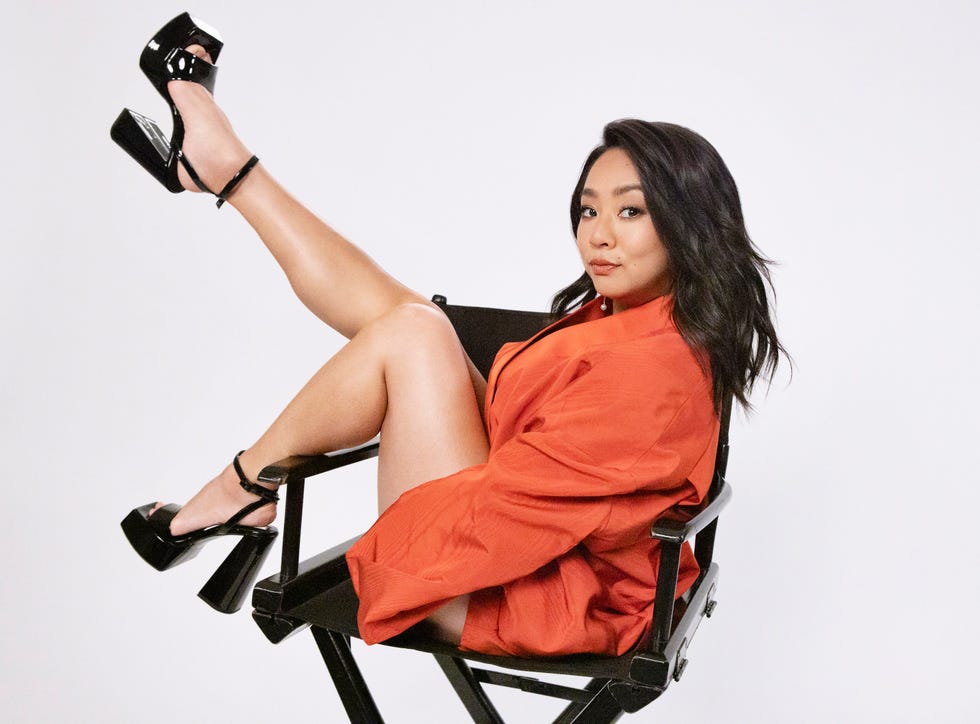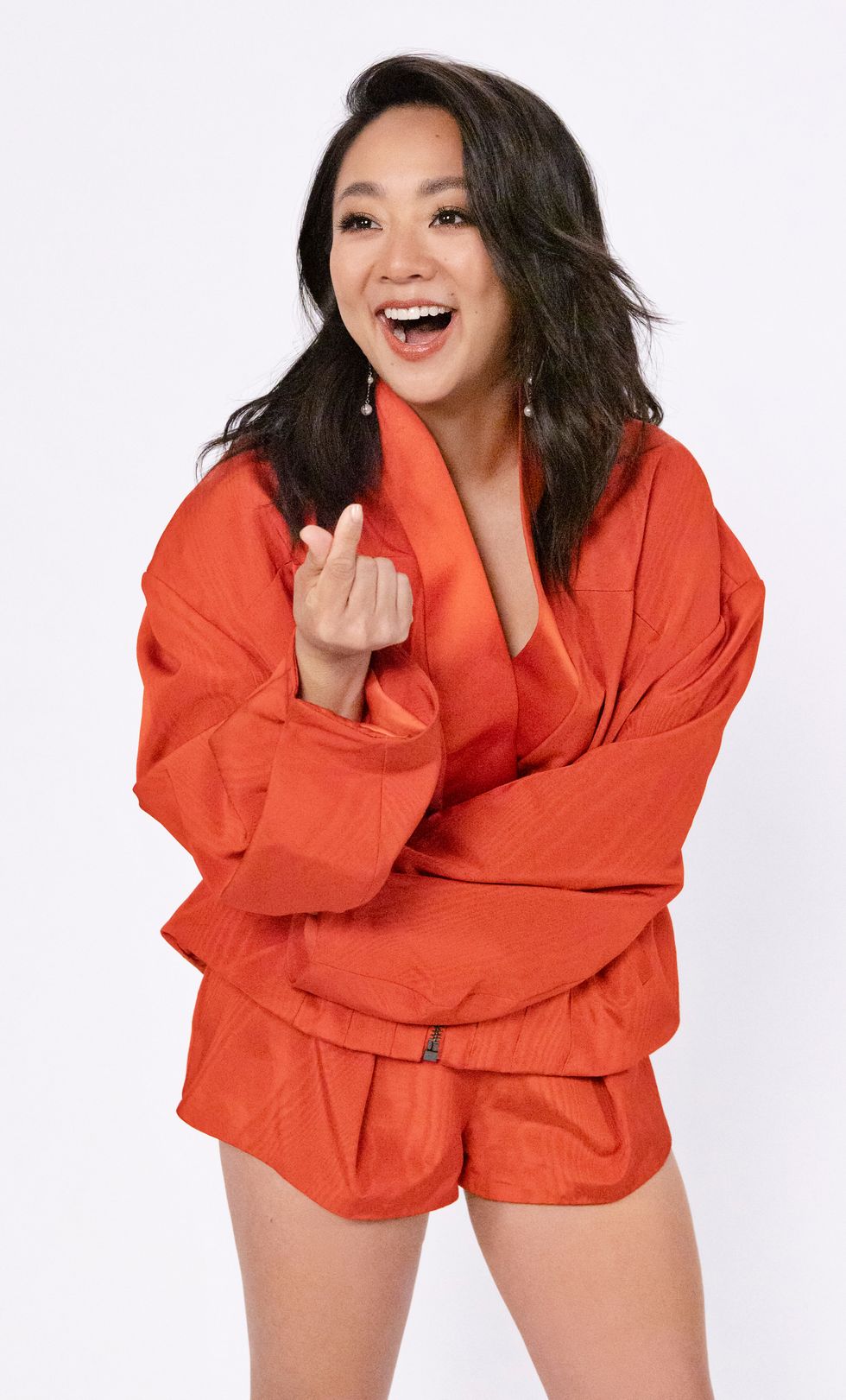Stephanie Hsu is not the same person she was before Oscar night. I’m not just talking about Everything Everywhere All at Once winning Best Picture; I’m talking about what happened after the ceremony. “I did shake hands with not only Jay-Z, but also Beyoncé. So I am walking around with different chemistry now in my body,” she says. Hsu is not usually one to fangirl, but that handshake was serious. “Something shifted in my existence.”
Something did shift, in Hsu’s universe and perhaps others, when Everything Everywhere was released last March. The multiverse saga starring now-Academy Award winners Michelle Yeoh and Ke Huy Quan struck a chord with its mix of bizarre humor, mind-bending martial arts, and intergenerational conflict in immigrant households. A year later, it turned Hsu into not only a Best Supporting Actress nominee but also a star. Clips of her audition tape circulated Twitter. People dressed up as her on Halloween. Before then, she played smaller roles on The Marvelous Mrs. Maisel, The Unbreakable Kimmy Schmidt, and even in the background of MTV’s Girl Code. Now, she’s recognized as one of the most promising young talents in Hollywood.
One year after debuting EEAAO at South by Southwest, Hsu returned to premiere her next film, Joy Ride. Directed by Crazy Rich Asians screenwriter Adele Lim, it’s an R-rated comedy in the vein of Girls Trip and Bridesmaids that follows four unlikely friends on a road trip gone wrong through China. The premiere marked a full circle moment (or full bagel) for Hsu.
“I haven’t had a lot of time to process everything that happened last year, and there was something very symbolic being at South by one year later, feeling not only how much has shifted in my life and my whole spirit, but how much has changed in the industry for the Asian community,” she says over Zoom from San Francisco, wearing a bright red outfit in front of a white backdrop, as bold as a blot of red ink on paper. “Off the coattails of the Oscars to get to bring in a raunchy rated-R film and be like, ‘We did that, now watch us do this,’ that was very special.”
In Joy Ride, Ashley Park (Emily in Paris) stars as Audrey, a type-A girlboss searching for her birth mother after a business deal goes awry; Sherry Cola (Good Trouble) is her childhood best friend and artist Lolo; comedian Sabrina Wu is Deadeye, her oddball cousin; and Hsu is Kat, Audrey’s college pal who became a Chinese soap opera star. Kat, squeaky-clean on the outside and a massive horndog on the inside, shows yet another side of Hsu’s range. It’s less maniacal than the many-faced villain Jobu Tupaki but still allows her to push boundaries and have fun.
“I think on the page it goes hard,” she says of the script, “but I do think that we [the cast] went harder. I think that there is a little bit of a mob mentality that happens when we’re all together where we just start to become even more unhinged.” In fact, in one of her wildest memories from filming, she and Wu improvised Deadeye stuffing drugs up Kat’s butt to hide it from the police. “We’re giggling to ourselves, and then Adele comes up to us and she was like, ‘I think that’s a little too much.’ I was like, “You think this is too much? Have you been here?…So we just kept it, because we begged, and it made it to the cut and into the trailer.”
Hsu and her co-stars really were that close. During production, they lived in the same apartment hotel, all on adjacent floors. “We call it the summer camp we never had when we were little.” After long days of filming, they’d hang out at each other’s places to order food, debrief about work, and play board games. “Sabrina’s very competitive, so is Ashley, so are our creators, so they would just play Catan until four in the morning.” Sometimes Park would just crash on the couch. “Ashley has this thing where she really likes to fall asleep in public,” Hsu says.
The original title for Joy Ride was actually Joy Fuck Club, a reference to Amy Tan’s book and the first major-studio film to star an all-Asian cast, but they ultimately didn’t get permission. Still, Hsu likes knowing it’s part of Joy Ride’s origin story, “because it does subvert this model stereotype myth, and it does feel like that was the core of our chaos.” That’s what’s groundbreaking about this movie: that four Asian characters—three women and one non-binary person—can inhabit a space traditionally reserved for white dudes. But it’s also rooted in a simple, not-so-radical truth: that Asian people have sexual urges and misbehave too. That’s part of what drew Hsu to the project, but also because the film is a riot.
“When it’s a really good script, you’re like, ‘Oh, I just want to do that.’ It felt so exciting to get to do what we never get to do, which is to be completely unhinged, disgusting, grotesque, chaotic, wild, but still so full of heart. I was like, ‘I’ve never seen that before.’ Once we got into set, it was just, how do we have the most fun humanly possible? We were not too in our heads about intentionally subverting, because as you know, we just live our lives. There’s nothing subverting about my life.”
If you think Joy Ride is a surprise for Hsu, just know that raunchy material is in her roots. Back when she was at freshman orientation at NYU, she had a sort of artistic awakening to a song about condoms. Let me explain: There is a tradition at the university where, during Welcome Week, students and alumni (usually from Tisch, naturally) perform musical sketches and bits about college life—from navigating campus to awkward sex—for the newbies. It’s called the Reality Show. To some, it’s peak cringe, to Hsu, it was “a huge part of my education.”
“I saw the Reality Show, I watched them sing songs about condoms and do a musical number about having safe sex in college, and I was like, ‘I want to do that,’” she says. And so she did, for almost every year she was at NYU before graduating early. She even assistant-directed and brought the program to the school’s campuses in Shanghai, then Abu Dhabi. The show’s founder, experimental theater legend Liz Swados, took Hsu under her wing.
So perhaps she had some experience for the explicit nature of Joy Ride, but then again, it’s not like the average acting career prepares you for a sex scene with a basketball and a Theragun. “I guess we’re all nuts,” Hsu laughs. “I don’t know why I didn’t question every single thing.” Of course Joy Ride has a ridiculous sex scene (well, a whole montage, really), and of course it involves a basketball team staying at the friends’ hotel. Hsu was actually the first of her castmates to film her segment. “It’s crazy, there’s a crane above you doing the overhead shot, while someone’s Theragun-ing a basketball between your legs, and you’re supposed to make these crazy noises, and you’ve known everybody for a week. Yeah, it was pretty wild.”
But she found power in it, too. “It is really empowering to be like, ‘I feel comfortable in my skin. I feel comfortable in myself to be doing this in a way that is sexualized but hilarious and strange and meant to be funny and weird and just empowering.’” When it came to safety, the cast worked with an intimacy coordinator on set. And Hsu would like to make it known that she used a body double for a certain NSFW tattoo reveal scene. “Make sure my mother gets that memo,” she jokes.
With Joy Ride, Everything Everywhere, and the recent Disney+ series American Born Chinese, in which Hsu guest-starred and reunited with Michelle Yeoh (“I love her so much,” she says. “It does feel like family.”), she is in a fortunate, rare position. She has been on sets with predominantly Asian creatives and telling Asian stories that have reached the mainstream market. The significance isn’t lost on her.
“I avoided the mainstream for a really long time, because I felt that the only roles that were available for us were ones in which we were stereotyped and would be dehumanizing,” she says. “So I just was like, ‘I’ll do experimental theater forever and ever and just do contact improv with international German dancers, and that is going to be my happy place.’… I haven’t been intentionally only working with Asian casts or Asian people, I’ve also worked with a lot of other creatives as well, but I think why people are responding to that is because honestly, those characters and those opportunities have been some of the fullest that I’ve been able to embody, especially with Joy and Jobu [of Everything Everywhere].”
But she also doesn’t want herself, or fellow Asians, to feel pigeonholed into roles that speak solely to identity. In fact, one of her favorite roles was on Rian Johnson’s murder mystery series Poker Face, where she guest-starred as a pickpocket named Mortimer Bernstein.
“I want us to, for lack of a better term, integrate our stories and be able to really make art that is also outside of identity,” says Hsu. “I am really proud to be surrounded by such an amazing community, to get to tell these stories that we’ve never seen when we’ve been alive on this planet, and also I am excited for the stories to expand outside of identity as well. I think we need both. We need all of it.”
She makes sure to add, though: “But I will say that every time I work with all-Asian cast, the meals that we have are just hands-down better. Just, the dinners are so good. That in itself is so nice, it’s so special.”
Up next, Hsu will appear in The Fall Guy from Deadpool director David Leitch alongside Ryan Gosling and Emily Blunt. All she can say for now is that it’s “a crazy, full-of-heart, funny, funny, funny, funny action film” and that “Ryan and Emily are so funny.” But even further ahead, she’s still working out her long-term plan. “I think I’m still bushwhacking for sure, and I’m just making my own path as it comes.”
Hsu says she first toyed with the idea of becoming an actor in high school, when instead of writing an essay about mitochondria, she asked to make a home video instead. That led to her gathering her friends to make funny videos on a handheld camcorder. She’s been chasing that collaborative feeling ever since. “I’ve always come from a background of making things with friends,” she explains, and the biggest gift she’s received in the past year is the opportunity to do that even more. “I feel this space opening up for me to get to tell stories that I want to tell, or green-light or produce, direct, make, write the stories that I want to make.”
Hsu pictures herself becoming “more multi-hyphenate” down the road—perhaps even returning to experimental theater. She knows getting her passion projects off the ground will be a challenge, but it’s one that excites her, especially if she’ll be able to work with people she loves.
“That’s my favorite thing,” she says, “just bringing hundreds of other people onto set that you want to support and you want to lift up.”
Joy Ride is now playing in theaters.
Erica Gonzales is the Senior Culture Editor at ELLE.com, where she oversees coverage on TV, movies, music, books, and more. She was previously an editor at HarpersBAZAAR.com. There is a 75 percent chance she’s listening to Lorde right now.



